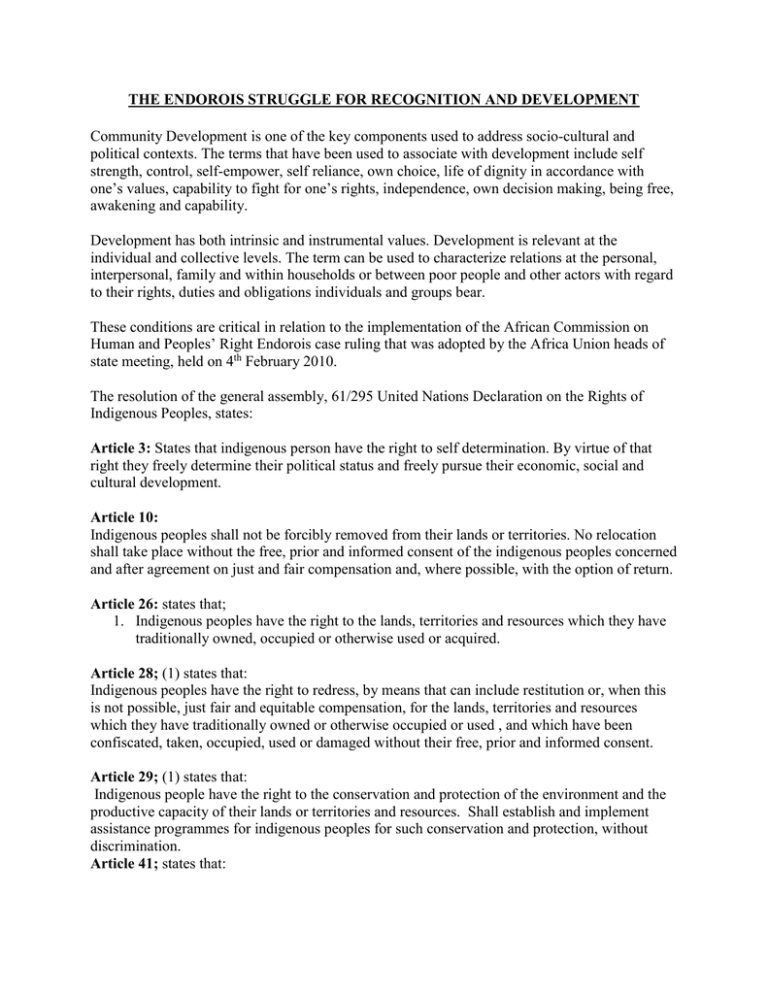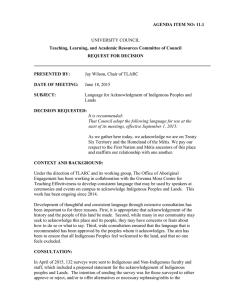Document 17693504
advertisement

THE ENDOROIS STRUGGLE FOR RECOGNITION AND DEVELOPMENT Community Development is one of the key components used to address socio-cultural and political contexts. The terms that have been used to associate with development include self strength, control, self-empower, self reliance, own choice, life of dignity in accordance with one’s values, capability to fight for one’s rights, independence, own decision making, being free, awakening and capability. Development has both intrinsic and instrumental values. Development is relevant at the individual and collective levels. The term can be used to characterize relations at the personal, interpersonal, family and within households or between poor people and other actors with regard to their rights, duties and obligations individuals and groups bear. These conditions are critical in relation to the implementation of the African Commission on Human and Peoples’ Right Endorois case ruling that was adopted by the Africa Union heads of state meeting, held on 4th February 2010. The resolution of the general assembly, 61/295 United Nations Declaration on the Rights of Indigenous Peoples, states: Article 3: States that indigenous person have the right to self determination. By virtue of that right they freely determine their political status and freely pursue their economic, social and cultural development. Article 10: Indigenous peoples shall not be forcibly removed from their lands or territories. No relocation shall take place without the free, prior and informed consent of the indigenous peoples concerned and after agreement on just and fair compensation and, where possible, with the option of return. Article 26: states that; 1. Indigenous peoples have the right to the lands, territories and resources which they have traditionally owned, occupied or otherwise used or acquired. Article 28; (1) states that: Indigenous peoples have the right to redress, by means that can include restitution or, when this is not possible, just fair and equitable compensation, for the lands, territories and resources which they have traditionally owned or otherwise occupied or used , and which have been confiscated, taken, occupied, used or damaged without their free, prior and informed consent. Article 29; (1) states that: Indigenous people have the right to the conservation and protection of the environment and the productive capacity of their lands or territories and resources. Shall establish and implement assistance programmes for indigenous peoples for such conservation and protection, without discrimination. Article 41; states that: The organs and specialised agencies of the United Nations system and other intergovernmental organizations shall contribute to the full realization of the provisions of this declaration through the mobilization, inter alia, of financial cooperation and technical assistance. Ways and means of ensuring participation of indigenous peoples’ on issues affecting them shall be established. Article 42; gives:The United Nations, its bodies, including the permanent forum on indigenous issues, and specialised agencies, respect for and full application of the provisions of this declarations and follow up the effectiveness of this declaration. The Endorois Community therefore requests the United Nations for support in the implementation of African Commission on Human and peoples Right ruling which found the state party Kenya in violation of Articles1, 8, 14, 17, 21 and 22 of the African charter. The African Commission recommended that the respondent state: 1. Recognize rights of ownership to the Endorois and Restitute Endorois ancestral land. (a) Ensure that the Endorois community has unrestricted access to Lake Bogoria and surrounding sites for religious and cultural sites and for grazing their cattle. (b) Pay adequate compensation to the community for all the loss suffered. (c) Pay royalties to the Endorois from existing economic activities and ensure that they benefit from employment possibilities within the reserve. (d) Grant registration to the Endorois Welfare Committee (e) Engage in dialogue with the complainants for the effective implementation of these recommendations. (f) Report on the implementation of these recommendations within three months from the date of notification. 2. The African commission avails its good offices to assist the parties in the implementation of these recommendations. Development is a two pronged test, that it is both consultative and instrumental, or useful as both a means and end. A violation of either the procedural or substantive element constitutes a violation of the right to development. Chairperson The Endorois belief that UN work with the regional blocks (e.g. ACHPR, African Court of justice etc.), in promotion of human rights and development. Now, what role would UN play to support the Endorois in the implementation of the ACHPR ruling? How? would community based organizations like Endorois Welfare Council access the moral and technical support from the UN special Rapporteur on right to development?


